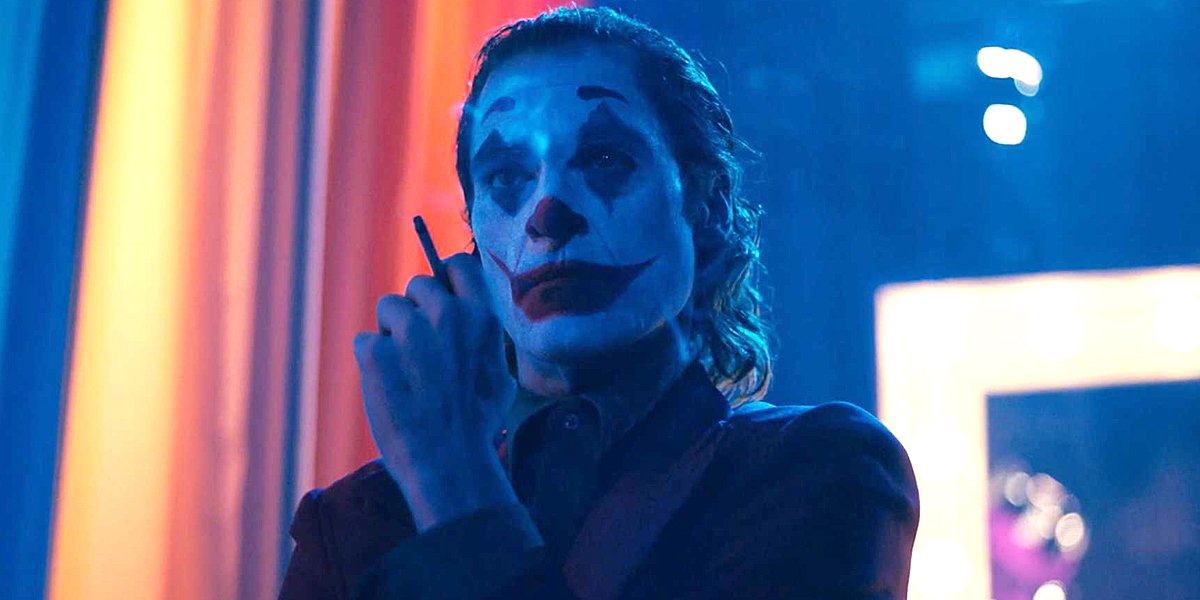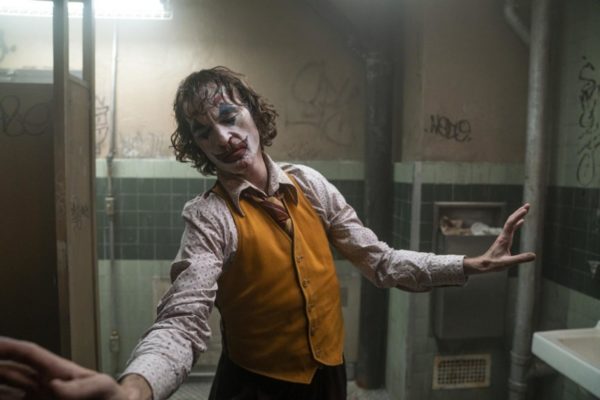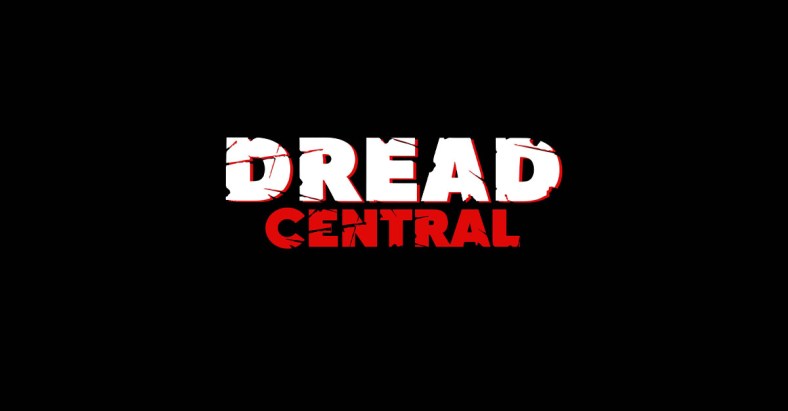
YOU GET WHAT YOU FUCKING DESERVE!
Joker (2019) is a psychological thriller movie directed by Todd Phillips (The Hangover Trilogy, War Dogs). It stars Joaquin Phoenix as Arthur Fleck, a failed comedian who turns into an insane criminal called Joker in the fictional Gotham City.

When I went to see Joker I had high expectations, because there were a lot of people who believed it was a masterpiece and others thought it was a violent and disturbing film that offered nothing, but shock value and a way to incite mass shootings. Generally speaking, I think that blaming a movie, or anything on the media for that matter (videogames, music, etc), for violent actions made by sick and violent individuals is a cheap scapegoat to face what's wrong with the world, which makes me ask: How are monsters created?

Joker is one of my favorite comic book villains ever, and I love the different interpretations made by writers, directors, and so on and so forth. Joker is a cultural icon as much as Batman and one cannot exist without bringing the other into the conversation. There are many incarnations of Joker such as The Batman Who Laughs, one of the scariest and most brutal villains Batman has had in the last few years or the critically-aclaimed Heath Ledger's Joker on the film The Dark Knight (2008) directed by Christopher Nolan or the infamous Jared Leto's version of the character in Suicide Squad (2016) directed by David Ayer. The list is endless and this new version portrayed by Phoenix is a wonder.

Joker is the story of man called Arthur Fleck, a comedian who suffers from a mental disorder that causes him to laugh uncontrollably and needs medication on a daily basis. Arthur has had it rough for some time: No friends, girlfriend or a good job, and has the responsibility to take care of his sick mother who writes letter to Thomas Wayne, father of you-know-who. The film is set in 1981, in Gotham City, and it is a rotten place: Full of trash, crime, corruption, hatred, inequality... A true living hell in which there is no Batman yet, so things can only get worse.

Humanizing someome like the Joker is a tough job, because you are humanizing a mass murderer, someone who kills on a whim, someone who laughs at the most horrific things that you can do to another human being, and somehow it worked. Joker does a wonderful job at creating a villain origin. It shows us a man who struggles with his demons and his surroundings and how someone who takes too much shit is led to a breaking point where there is no return.

Humanizing someome like the Joker is a tough job, because you are humanizing a mass murderer, someone who kills on a whim, someone who laughs at the most horrific things that you can do to another human being, and somehow it worked. Joker does a wonderful job at creating a villain origin. It shows us a man who struggles with his demons and his surroundings and how someone who takes too much shit is led to a breaking point where there is no return.

The film criticizes the human condition and society (yes, I went there): In Joker everybody treats our main character like trash. The city is cruel and unrelenting, nobody tries to understand Arthur and this leads him further into isolating himself and becoming the worst version of himself. Monsters come in many shapes, colors and forms, and we usually just see the result of the things these so-called monsters do, but never go further into the root of the problem. Are people evil from the start? Are these mentally ill people to blame for everything? Do we collaborate to create them? I do believe that we help to create bad people by neglecting them and not giving them proper help. Mentally ill people are outcasts and people tend to ignore them as if they didn't exist at all. I'm not saying that having mental problems serves as a catalyst and/or a justification to do horrible crimes, but not giving a helping hand to the ones who need it is a big mistake and a cruel act.

Joker also tackles social issues, such as the inequality between the rich and poor in Gotham City, and how the powerful people like Thomas Wayne have everything while there are people on the streets begging for food and money. Some see an anti-systemic or anti-capitalist message in this movie, and I can't say that I disagree with those people.

Joker draws heavy influence from Scorsese's films such as Taxi Driver (1976) or The King of Comedy (1983). You can see that in the oppressive atmosphere the film offers and the fact that it is set in the 80's. Todd Phillips took concepts that we have previously seen on cinema, but put a new perspective to them to create a sad tale about a clown that brings more than just laughs. I like that despite the fact that it can be enjoyed by comic and non-comic fans alike, Joker gives the hard-to-please people an excellent Joker and Batman origin, reminding us that the two of them will always have fates intertwined, whether they want it or not.

As said before, Joaquin Phoenix does a wonderful job as the clown prince of crime, an Oscar-worthy performance, and Robert De Niro as the talk show host Murray Franklin is superb. Zazie Beetz and Frances Conroy are also great additions to the cast, among many others.
The music in the film plays an important role as well. Ranging from popular songs from the era the film is set in to an incredible and sorrowful original score composed by Hildur Guðnadóttir. The bathroom scene wouldn't be the same without that beautiful music.
The cinematography is amazing and you can see some references to Ledger's Joker in some scenes. The color palette has many colors, but mainly really opaque and oppresive shades to give us the feelings of isolation and despair our main character feels.

This world is a jungle full of predators, and Arthur was a prey who became a monster in order to survive. Moreover, Todd Phillips's Joker, as mentioned before, is a critique to our society (yes, I went there again), our capitalist system and how the poor, the oppressed and the misunderstood are screwed by the rich and powerful, and how a mentally unstable and broken man can become an icon against them by doing horrific things to be heard and seen in a city that simply doesn't want him to exist.

Joker also tackles social issues, such as the inequality between the rich and poor in Gotham City, and how the powerful people like Thomas Wayne have everything while there are people on the streets begging for food and money. Some see an anti-systemic or anti-capitalist message in this movie, and I can't say that I disagree with those people.

Joker draws heavy influence from Scorsese's films such as Taxi Driver (1976) or The King of Comedy (1983). You can see that in the oppressive atmosphere the film offers and the fact that it is set in the 80's. Todd Phillips took concepts that we have previously seen on cinema, but put a new perspective to them to create a sad tale about a clown that brings more than just laughs. I like that despite the fact that it can be enjoyed by comic and non-comic fans alike, Joker gives the hard-to-please people an excellent Joker and Batman origin, reminding us that the two of them will always have fates intertwined, whether they want it or not.

As said before, Joaquin Phoenix does a wonderful job as the clown prince of crime, an Oscar-worthy performance, and Robert De Niro as the talk show host Murray Franklin is superb. Zazie Beetz and Frances Conroy are also great additions to the cast, among many others.
The music in the film plays an important role as well. Ranging from popular songs from the era the film is set in to an incredible and sorrowful original score composed by Hildur Guðnadóttir. The bathroom scene wouldn't be the same without that beautiful music.
The cinematography is amazing and you can see some references to Ledger's Joker in some scenes. The color palette has many colors, but mainly really opaque and oppresive shades to give us the feelings of isolation and despair our main character feels.

This world is a jungle full of predators, and Arthur was a prey who became a monster in order to survive. Moreover, Todd Phillips's Joker, as mentioned before, is a critique to our society (yes, I went there again), our capitalist system and how the poor, the oppressed and the misunderstood are screwed by the rich and powerful, and how a mentally unstable and broken man can become an icon against them by doing horrific things to be heard and seen in a city that simply doesn't want him to exist.